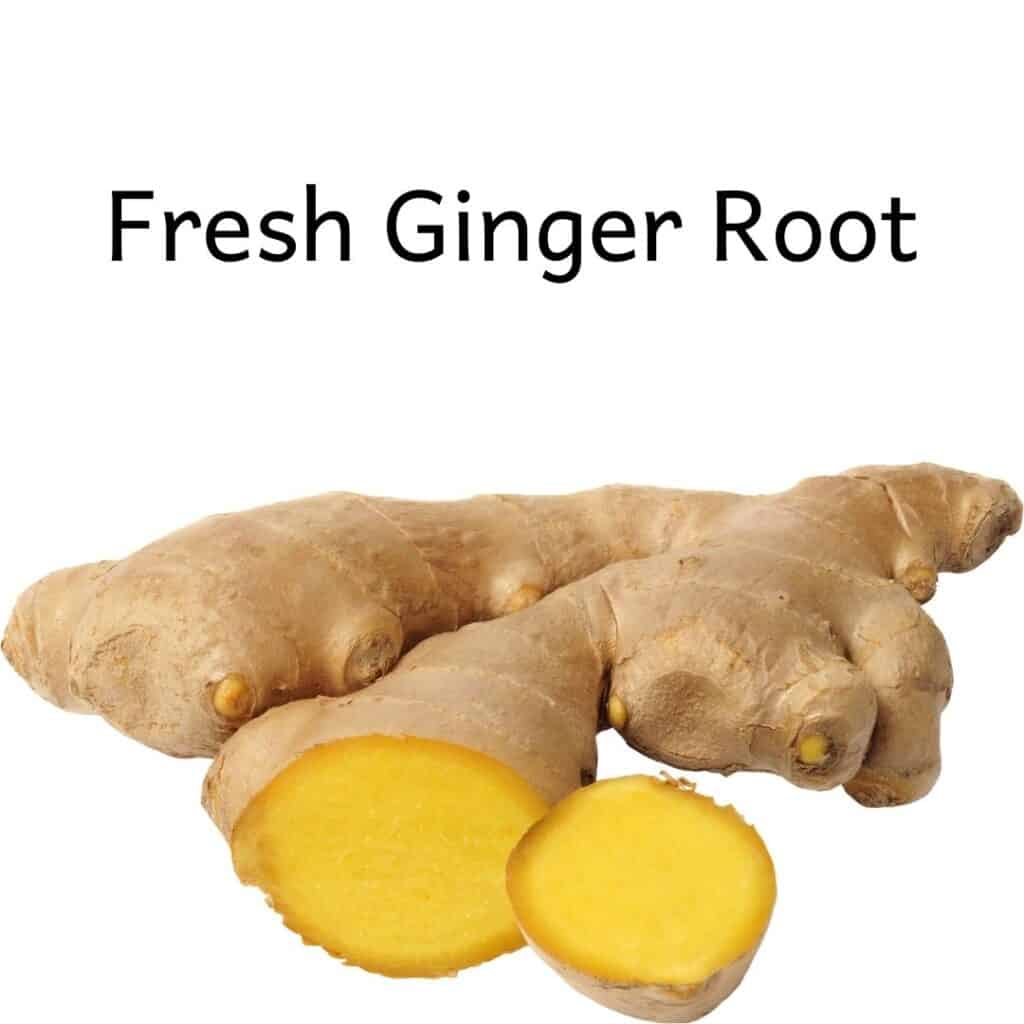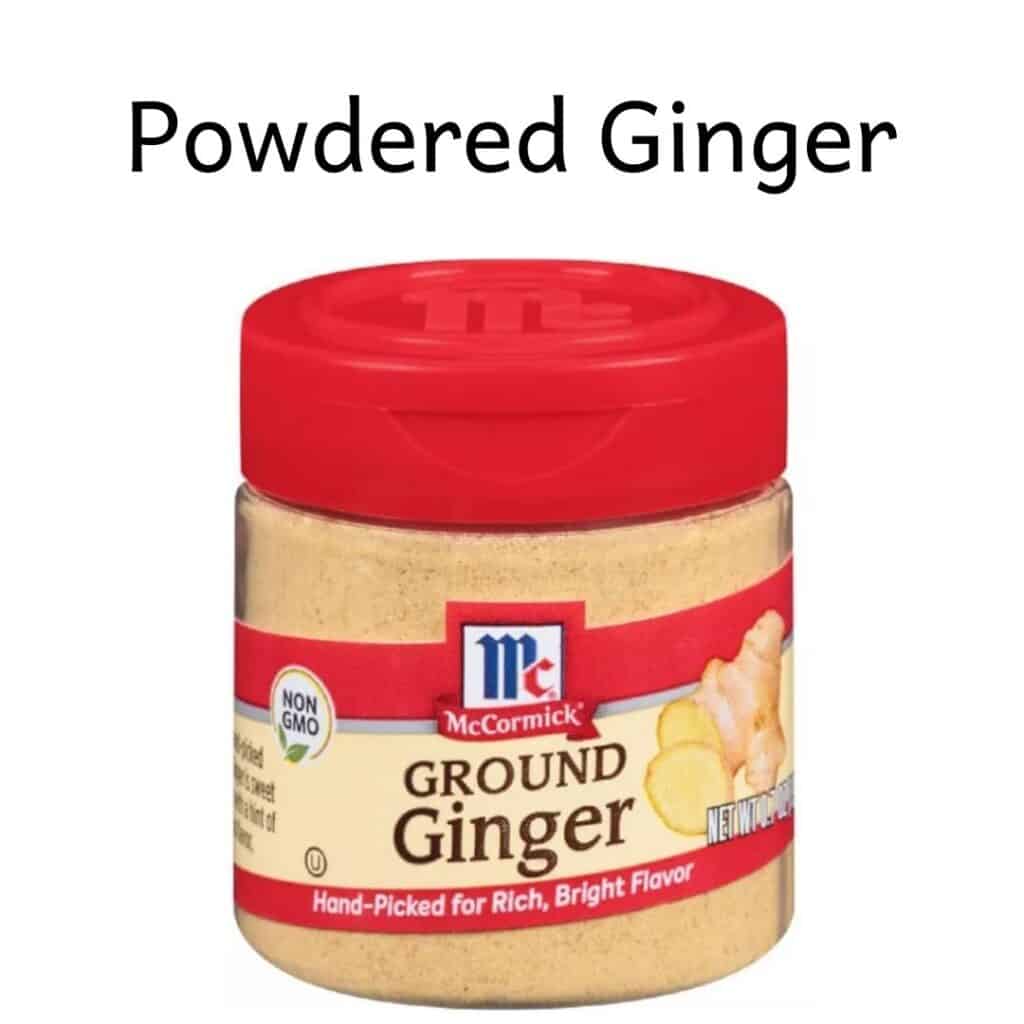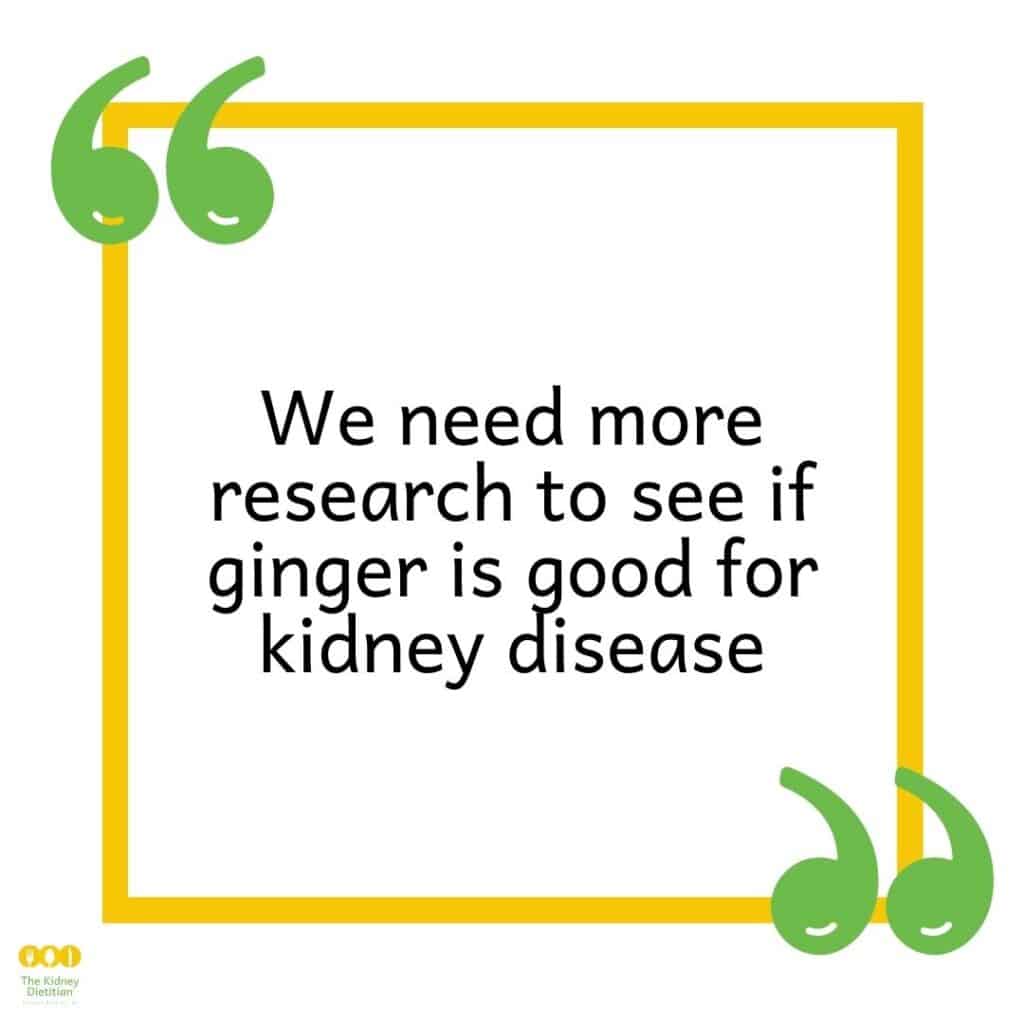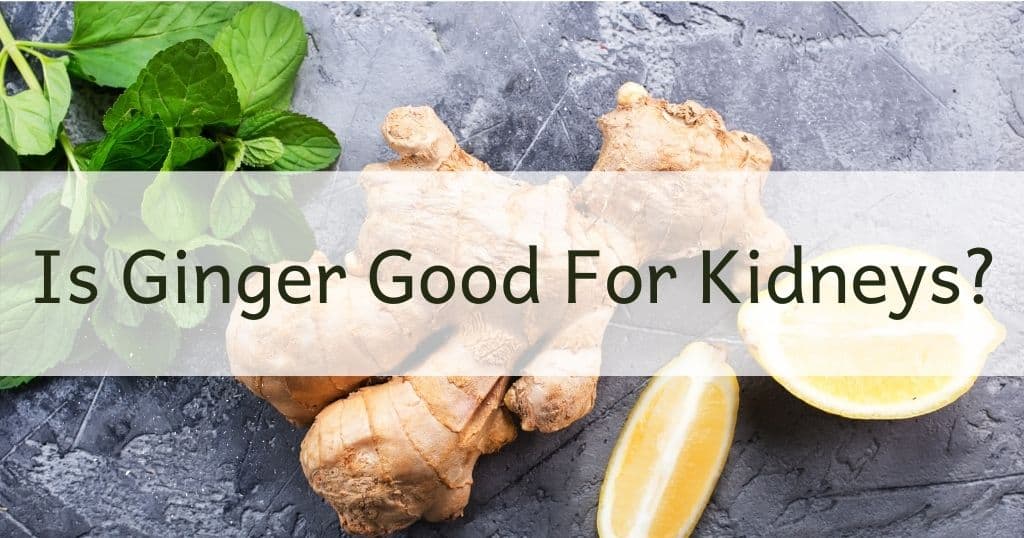Is this unassuming kitchen spice the key to kidney health? Or, should ginger at least be part of a kidney friendly diet? Read on to learn more about ginger, it’s health benefits, risks and if ginger is good for kidneys!
*Please note that this post contains clearly identified affiliate links. As an Amazon affiliate, I may earn a small commission on qualifying purchases (at no extra cost to you).
Table of Contents
What Is Ginger?
What is ginger in the first place? Ginger is actually a plant with long spiky green leaves. What we know as ginger is actually this plant’s root.
Ginger is part of a family of flowering plants called Zingiberaceae that originated in Southeast Asia. This family of plants also includes turmeric and cardamom!
Forms of Ginger
Fresh Ginger Root
The most non-processed form of ginger is the root of the ginger plant itself! Fresh ginger root is packed with flavor.
You can buy fresh ginger root at the grocery store. You can usually find it in the produce section.

Pickled Ginger
Pickled ginger is fresh ginger root that is pickled in a sugar and salt brine. It is commonly served with sushi!
Like most pickled foods, pickled ginger has a lot of sodium in it. Two tablespoons of pickled ginger has about 360 milligrams of sodium.
Crystallized Ginger
Crystallized (or “candied”) ginger is ginger root that is cooked, tossed with sugar and dehydrated.
A 1/4 cup of candied ginger has around 35 grams of sugar.
Dried or Powdered Ginger
Dried (or “powdered”) ginger is ginger root that is dried and made into a powder. You’ll find this ginger in the spice isle at the grocery store.

Ginger Tea
You can make your own ginger tea by letting fresh ginger root sit in hot water. Or, there are many ginger teas available on the market.
Be careful of other ingredients in ginger teas. Some ginger teas have ingredients that are bad for kidneys, such as licorice root. The National Kidney Foundation has a list of herbal ingredients and supplements to avoid.
Ginger Supplements or Extracts
Ginger is also available as an herbal supplement pill or liquid extract. These products are very concentrated forms of ginger.
Please know that herbal supplements are not regulated in the United States. (1)
Ginger Health Benefits
Most notably, ginger can help with nausea. Research into ginger has focused on nausea associated with pregnancy, motion sickness and cancer treatment when used with other medications. (2)
Ginger has been used for centuries to treat a variety of conditions including asthma, menstrual cramps, diabetes, and upset stomach. Although research investigated ginger in many of these conditions, most studies are very small and only done in animals.
Limited research has shown that ginger may help with:
- Cancer prevention, as it is a potent source of antioxidants (3)
- Inflammation, especially in arthritis (4)
- High blood sugar in animals with diabetes (5) (6)
- High blood pressure (7)
- High cholesterol (5) (8) (9)
We need more research to recommend ginger for these health conditions. (2)
Is Ginger Good for Kidneys?
Studies have investigated ginger for kidney health. Most of these studies are very small, and done in rats. So, it is hard to make recommendations for humans.
But, ginger does seem to have some beneficial effects for kidneys.
Ginger & Kidney Disease
Ginger seems to have some benefits in kidney disease. Small studies using rats have found that ginger protects kidneys from inflammation from a variety of health conditions, metal toxicity and pro-inflammatory fructose. (4) (6) (10) (11)
Two studies also found better kidney function in rats with diabetes when given ginger supplements. (5) (6)
We need more research to see if ginger is good for kidney disease. We need to know how much ginger, and in what form, we need to help our kidneys.

Ginger & Kidney Stones
No research has been done to see if ginger is good for kidney stones.
Ginger does have a fair amount of oxalate. And, most of that oxalate is soluble, which makes it more absorbable. (12) It is unlikely that eating or cooking with ginger will add a significant amount of oxalate to your diet. But, ginger supplements and extracts might. I’d recommend avoiding ginger supplements if you have high urine oxalate.
Risks of Taking Ginger
There are some risks you should know before you add a lot of ginger to your diet.
Blood Thinning
Ginger has an anticoagulant effect. If you take a blood thinner, like coumadin, avoid ginger supplements. (13)
Low Blood Pressure
Because ginger can lower blood pressure, you should tell your doctor if you are taking ginger supplements. Especially if you take blood pressure medication or have dangerously low blood pressure.
Side Effects
Like most supplements, ginger doesn’t come without side effects.
Very high doses of ginger (more than 4 grams per day) could cause: (13)
- Upset stomach
- Gas
- Diarrhea
- Heartburn
- Mouth and throat irritation
Of note, risks are much higher if you take ginger in supplement form. The dose of ginger in supplements is usually much higher compared to ginger itself. Ginger used in cooking, or eaten in normal amounts, is unlikely to cause side effects.
How to Add Ginger to a Kidney Diet
If you want to add ginger to your diet, I’d recommend turning to ginger foods, rather than supplements. We need more research before I can recommend ginger as a supplement to help kidneys.
However, it is clear that ginger has some kidney healthy benefits. So, it might be a good idea to add more ginger to your day! Adding ginger in non-supplement form is unlikely to cause harm.
How To Cook Fresh Ginger Root
Compared to dried ginger, fresh ginger will definitely add the most flavor to your food! Using fresh ginger is a little more work, but well worth it in my book!
To prepare fresh ginger, you can peel it using a vegetable peeler or a spoon! Then, use a sharp knife to mince, slice, or chop it.
Add minced ginger directly into homemade salad dressing or salads. Yes, you can eat ginger raw! Make your own ginger dressing for this spaghetti ginger salad!
For cooked dishes, sauté fresh ginger in a little oil along with ingredients like onion or garlic. This is a tasty way to start soups, stews, curries, or stir-fries! This Thai vegetable curry is a great example.
Convenience Ginger
You can buy fresh ginger that has already been chopped or pureed. As always, check the Nutrition Facts for these products. Many of these products have added sodium – around 130mg per teaspoon of ginger!
The Ginger People* and Lee Kum Kee* brands are low sodium options.
Ginger for Low Sodium Cooking
Because ginger is so tasty, it is a great way to make flavorful dishes without the salt. By adding tasty ingredients like ginger and other spices, you can cut back on how much salt you need.
Happy Eating!
Melanie



what ginger tea would you recommend for stage 3 kidney disease
Any type of ginger tea should be ok for CKD. Ask your dietitian what is best for you!
Hi Melanie, can you expound more on your comment below. It seems like what your saying is that there are other sources of Oxalates beyond our dietary control to contend with. Could a fatty liver lend to high Oxalate levels? And how do we deal with the liver if that is what you are suggesting to focus on?
Dietary oxalate only accounts for about 50% (MAXIMUM) of urine oxalate. Suggesting that liver production of oxalate might be more important to focus on – in addition to the fact that there really is no research to suggest that a low oxalate diet reduces stone risk, although it does somewhat reduce urine oxalate levels.
Hi Lorna! Yes – that liver production of oxalate is what accounts for that other 50% of urine oxalate levels. Many of the nutrition changes I talk about aim to reduce that urine production of oxalate (excess protein and sugar, being 2 of them). You might find this article helpful! If you’d like to work with me to understand what this means for stone prevention for YOU, and get my complete answers to all your questions, I’d love to meet you in Kidney Stone Nutrition School!
Melanie, I am trying to convince some colleagues to do some research on absorption of oxalates. It boggles the mind that this hasn’t been done. We know that dairy is frequently cited as reducing the chances of calcium oxalate stones, presumably because it has no oxalate, and the calcium is then free to bind in the gut, and calcium oxalate passes right through you. So the obvious question is, if you want to take substances that are quite clearly good for you (cumin, turmeric, pepper, ginger) but they have high oxalate, can we grind them up (for spices, done!) and ingest them at the same time as something with plenty of free calcium (kale?) and thus get the benefit while absorbing little or no oxalate. It all depends on the statistics of how often an oxalate molecule can get absorbed by the body without first meeting and binding to calcium. Seems like an obvious and worthy experiment, right? Basically take metered doses of various spices, both without a calcium adjunct, and with, and see what changes in the urine.
This is certainly an interesting question! There are huge variances in how much oxalate is absorbed from person to person depending on calcium and a whole host of other factors (the gut microbiota, for example). There is also the question of how much dietary/intestinal absorption of oxalate really matters for MOST people when it comes to stone formation (people with a history of GI surgery being a big outlier here). Dietary oxalate only accounts for about 50% (MAXIMUM) of urine oxalate. Suggesting that liver production of oxalate might be more important to focus on – in addition to the fact that there really is no research to suggest that a low oxalate diet reduces stone risk, although it does somewhat reduce urine oxalate levels. So many questions to be answered!
Just had ginger tea tonight. I’ve been having trouble with my blood pressure and had upset stomach. It was very good. Will try blueberry cobbler. Looks good. Thanks for info.
Hi Peg! Yum! Let us know what you think of the Blueberry Cobbler!